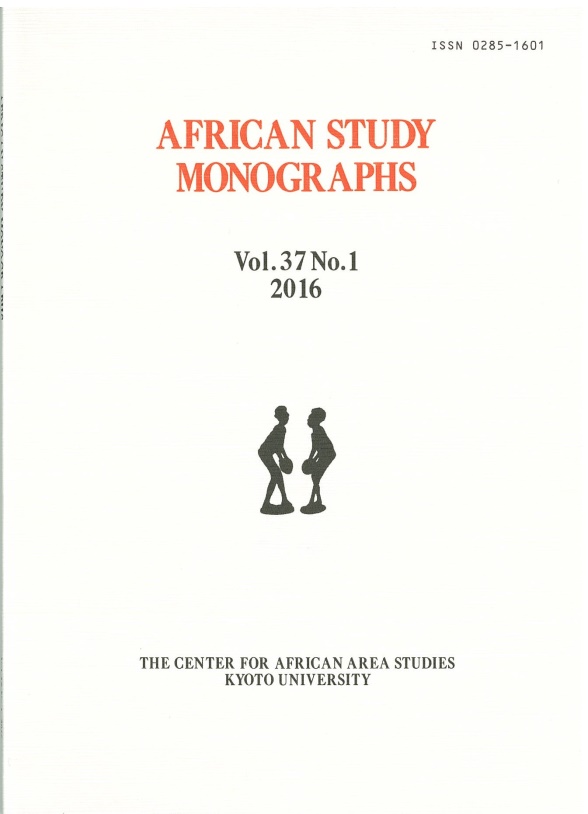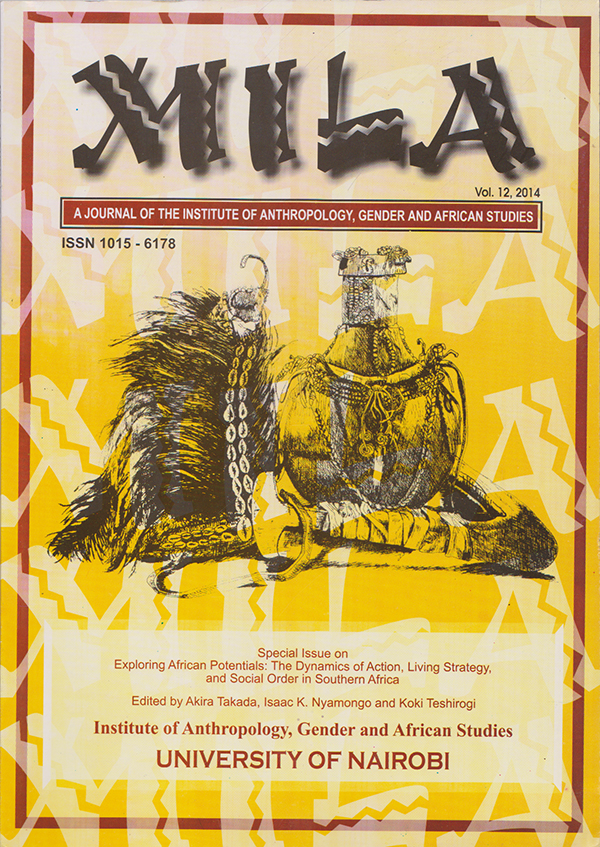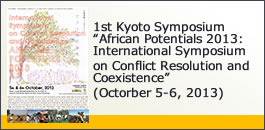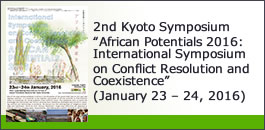[20th Public Workshop / 7th Meeting of Cluster on Southern Africa] “Long-term field study of ring-tailed lemurs in southern Madagascar” (Co-organized by the 206th Regular Seminar of the Center for African Area Studies) (November 20, 2014)
Date: November 20, 2014. 15:00 – 17:00
Venue: Middle-sized seminar room, 3F Inamori Center, Kyoto University
Program
Title: Long-term field study of ring-tailed lemurs in southern Madagascar
Presenter: Shinichiro Ichino (Kyoto University)
Abstract
Madagascar is a large island which is 1.6 times larger than the whole area of Japan and characterized by biodiversity with high endemism. In spite of that, it is estimated that Madagascar has lost more than 90% of its original forest. At Berenty Reserve in southern Madagascar, a field study of a diurnal prosimian, ring-tailed lemurs (Lemur catta), has been conducted since 1989. In this presentation, I introduce results of the long-term study; for example, longevity, life history traits and population dynamics of this endangered species. And I also discuss how long-term field study can contribute to forest ecosystem conservation in Madagascar.
[9th Meeting of Research Cluster on West Africa / 10th Meeting of Research Unit on Politics and International Relations] “Islamic Radicalization in Nigeria” (November 19, 2014)
Date: November 19, 2015. 16:00 – 18:00
Venue: Collaboration room 1 on the 4th floor, Building 18, Komaba
Campus, The University of Tokyo
Program
Prof Abdul Raufu Mustapha (Oxford University)
Violent Islamic Radicalization:Northern Nigeria in the light of the experience of southern Niger Republic
Informalization and Its Discontents: The Informal Economy and Islamic Radicalization in Northern Nigeria
Abstract
Mustapha, A. Raufu
Violent Islamic Radicalization: Northern Nigeria in the light of the experience of southern Niger Republic
At first glance, northern Nigeria and southern Niger Republic share a number of important religious, economic, and social characteristics.
- Both belong to the sahelian cultural belt just south of the Sahara, running from Senegal to Somalia; a zone in which Islam has exercised significant influence for over a thousand years.
- The two regions are also united by the prevalence the Hausa language.
- Both are regrettably regions of high levels of poverty and depressed socio-economic indicators.
- Finally, they both share a complex admixture of sectarian communities of Sufi Brotherhoods and reformist strands of Islam.
Since the early 19th century, religious and political ideas, religious groups, economic actors, and political forces have moved back and forth across the boundary between both regions. In the process, events in one region have tended to have ramifications for developments in the other. For instance, the Sokoto jihad of 1804 spread Qadiriyya Brotherhood influence to the territories that are now in Niger Republic and many ‘of the wealthiest merchants of Niger belong to this order, whose members are referred to locally as ‘yan sadalu’. Similarly, the Tijaniyya-Ibrahimiyya Brotherhood was spread from Kano to Niger in the 1950s and its members are known locally as the ‘yan kabalu’. Significantly, the Qadiriyya-Tijaniyya conflicts which racked Nigeria in the 1950s and 1960s also took place in Niger. In the same vein, the reformist Salafist Nigerian sect, Izala, also made an appearance in Niger Republic in the 1980s, having been formed in Nigeria. As in Nigeria, the appearance of this reformist Salafist sect generated high levels of religious discord with the established Sufis in Niger. And as happened in Nigeria, Izala also broke into two main factions.
Though the flow and ebb of ideas and people go in both directions, there is the recognition of Nigeria’s formidable cultural, religious, and economic influence on Niger. This is captured in the Nigerien saying: ‘When Nigeria has a cold, Niger coughs’.
Since 2009, northern Nigeria has been battling a stubborn Islamist insurgency spear-headed by the Boko Haram. Analysts have been speculating on the possible consequence of this insurgency for Niger Republic, given the shared characteristics between both regions. Why has there not been the development of a similar insurgency in Niger? This lecture reflects on this question. The lecture compares the drivers of possible radicalization in both regions, looking specifically at: (a) the variable cultural geographies of within and between the two region; (b) impact of historical forces; (c) the importance of economic processes; (d) the political and administrative dynamics in both regions; and (e) religious factors, especially the place of Christianity in both regions and the prevalence of some religious ideas such as secularism. Through such a comparison, it should become clearer why, despite their seeming similarities, violent Islamist radicalization remains dormant in southern Niger but active in northern Nigeria.
Meagher, K.M.B. Kelly (London School of Economics)
Informalization and Its Discontents: The Informal Economy and Islamic Radicalization in Northern Nigeria
This seminar explores the dark side of inclusive markets in the context of northern Nigeria. It examines how strategies of economic inclusion generate new dynamics of exclusion through processes of selective inclusion and marginalization. Despite the celebrated resurgence of the Nigerian economy, the majority of the population has remained trapped in the realities of jobless growth, rising poverty and expanding economic informality. The interface of historical disadvantage, economic reforms, and the dynamics of the global economy have exacerbated problems of regional inequality within Nigeria, concentrating the benefits of inclusive markets in the south and the negative side-effects in the northern region of the country, fostering escalating poverty, disaffection and Islamic extremism.
Drawing on fieldwork conducted in the northern Nigerian cities of Kano and Kaduna in 2014, I will explore the nature and limitations of inclusive economies within the context of northern Nigeria’s vibrant informal economy. I will focus on how inclusive economies have exacerbated economic stress within northern Nigeria, and generated new and increasingly problematic processes of exclusion. Based on interviews with operators and associational leaders in a selection of eight common informal production and service activities, I show how mounting economic pressures are restructuring patterns of ownership, social identity, educational attainment and religious affiliation within the informal economy. Indigenous institutions and networks of religious tolerance and economic interdependence are being eroded by new patterns of competition over access to informal jobs based on education and identity. Popular disaffection is heightened by human rights abuses by security forces and graduate employment programmes, which further marginalize poor and less-educated informal actors, exacerbating economic stress and resentment against the state, and creating a tinderbox for violence and Islamic extremism.
[10th Meeting of Research Unit on Politics and International Relations / 9th Meeting of Research Cluster on West Africa] “Islamic Radicalization in Nigeria” (November 19, 2014)
Date: November 19, 2015. 16:00 – 18:00
Venue: Collaboration room 1 on the 4th floor, Building 18, Komaba
Campus, The University of Tokyo
Program
Prof Abdul Raufu Mustapha (Oxford University)
Violent Islamic Radicalization:Northern Nigeria in the light of the experience of southern Niger Republic
Informalization and Its Discontents: The Informal Economy and Islamic Radicalization in Northern Nigeria
Abstract
Mustapha, A. Raufu
Violent Islamic Radicalization: Northern Nigeria in the light of the experience of southern Niger Republic
At first glance, northern Nigeria and southern Niger Republic share a number of important religious, economic, and social characteristics.
- Both belong to the sahelian cultural belt just south of the Sahara, running from Senegal to Somalia; a zone in which Islam has exercised significant influence for over a thousand years.
- The two regions are also united by the prevalence the Hausa language.
- Both are regrettably regions of high levels of poverty and depressed socio-economic indicators.
- Finally, they both share a complex admixture of sectarian communities of Sufi Brotherhoods and reformist strands of Islam.
Since the early 19th century, religious and political ideas, religious groups, economic actors, and political forces have moved back and forth across the boundary between both regions. In the process, events in one region have tended to have ramifications for developments in the other. For instance, the Sokoto jihad of 1804 spread Qadiriyya Brotherhood influence to the territories that are now in Niger Republic and many ‘of the wealthiest merchants of Niger belong to this order, whose members are referred to locally as ‘yan sadalu’. Similarly, the Tijaniyya-Ibrahimiyya Brotherhood was spread from Kano to Niger in the 1950s and its members are known locally as the ‘yan kabalu’. Significantly, the Qadiriyya-Tijaniyya conflicts which racked Nigeria in the 1950s and 1960s also took place in Niger. In the same vein, the reformist Salafist Nigerian sect, Izala, also made an appearance in Niger Republic in the 1980s, having been formed in Nigeria. As in Nigeria, the appearance of this reformist Salafist sect generated high levels of religious discord with the established Sufis in Niger. And as happened in Nigeria, Izala also broke into two main factions.
Though the flow and ebb of ideas and people go in both directions, there is the recognition of Nigeria’s formidable cultural, religious, and economic influence on Niger. This is captured in the Nigerien saying: ‘When Nigeria has a cold, Niger coughs’.
Since 2009, northern Nigeria has been battling a stubborn Islamist insurgency spear-headed by the Boko Haram. Analysts have been speculating on the possible consequence of this insurgency for Niger Republic, given the shared characteristics between both regions. Why has there not been the development of a similar insurgency in Niger? This lecture reflects on this question. The lecture compares the drivers of possible radicalization in both regions, looking specifically at: (a) the variable cultural geographies of within and between the two region; (b) impact of historical forces; (c) the importance of economic processes; (d) the political and administrative dynamics in both regions; and (e) religious factors, especially the place of Christianity in both regions and the prevalence of some religious ideas such as secularism. Through such a comparison, it should become clearer why, despite their seeming similarities, violent Islamist radicalization remains dormant in southern Niger but active in northern Nigeria.
Meagher, K.M.B. Kelly (London School of Economics)
Informalization and Its Discontents: The Informal Economy and Islamic Radicalization in Northern Nigeria
This seminar explores the dark side of inclusive markets in the context of northern Nigeria. It examines how strategies of economic inclusion generate new dynamics of exclusion through processes of selective inclusion and marginalization. Despite the celebrated resurgence of the Nigerian economy, the majority of the population has remained trapped in the realities of jobless growth, rising poverty and expanding economic informality. The interface of historical disadvantage, economic reforms, and the dynamics of the global economy have exacerbated problems of regional inequality within Nigeria, concentrating the benefits of inclusive markets in the south and the negative side-effects in the northern region of the country, fostering escalating poverty, disaffection and Islamic extremism.
Drawing on fieldwork conducted in the northern Nigerian cities of Kano and Kaduna in 2014, I will explore the nature and limitations of inclusive economies within the context of northern Nigeria’s vibrant informal economy. I will focus on how inclusive economies have exacerbated economic stress within northern Nigeria, and generated new and increasingly problematic processes of exclusion. Based on interviews with operators and associational leaders in a selection of eight common informal production and service activities, I show how mounting economic pressures are restructuring patterns of ownership, social identity, educational attainment and religious affiliation within the informal economy. Indigenous institutions and networks of religious tolerance and economic interdependence are being eroded by new patterns of competition over access to informal jobs based on education and identity. Popular disaffection is heightened by human rights abuses by security forces and graduate employment programmes, which further marginalize poor and less-educated informal actors, exacerbating economic stress and resentment against the state, and creating a tinderbox for violence and Islamic extremism.
[18th Plenary Committee Meeting] Special forum “For the Yaounde Forum 2014” (November 8, 2014)
Date: November 8, 2014. 14:00-17:30
Venue: Middle-sized Meeting Room, Inamori Foundation Memorial Building, Kyoto University
Program
14:00-14:10 Misa Hirano-Nomoto (Kyoto University)
“Statement of purpose: For the Forum in Yaounde”
14:10-14:35 Hisashi Matsumoto (Yokohama National University)
“Immigrants and Chieftaincy Titles: African Potential and Traditional Authority”
14:35-15:00 Hidetoshi Kondo (Kansai University of Foreign Studies)
“Enchanted Transition of Relations: Reconsidering the Conflict Relationship in Witchcraft Research in Africa”
15:00-15:25 Takao Shimizu (Research Institute for Humanity and Nature)
“Non-resistant Acts for the Survival of Marginalized Muslims: Reproduction of Muslims in Burkina Faso”
15:25-15:40 Coffee/Tea Break
15:40-16:05 Hideyuki Okano (Osaka University)
“Public Authorization of the Informal Sector: Case Study of the Motorcycle Taxi Industry in Post-conflict Sierra Leone”
16:05-16:30 Takanori Oishi (Research Institute for Humanity and Nature)
“Conflicts Over Land in the Recent Cacao Production Expansion Process in South-Eastern Cameroon: Inter-ethnic Negotiation and Cultural Propagation in a Multi-ethnic Setting”
16:30-17:30 General Discussion
Report
“Statement of purpose: For the Forum in Yaounde”
Misa Hirano-Nomoto (Kyoto University)
A briefing was given for the international forum in Yaounde held on the 5th and 6th of December, 2014, including the preparation updates, purpose of the forum and the structure of the sessions. After the presentation, summaries by keynote and other speakers were explained, and the purpose of the day’s plenary committee meeting was shared.
“Immigrants and Chieftaincy Titles: African Potential and Traditional Authority” Hisashi Matsumoto (Yokohama National University)
The society of the Igbo people, one of the three largest ethnic groups in Nigeria, previously had a decentralized social structure, but titles such as king and chief have recently been created and awarded. The Igbo are known as “traders” or “migrants”. Each region has successful traders, and some of them receive titles. This trend is sometimes criticized as a trade of titles. People who have received such titles wear costumes symbolizing chiefs and give handshakes in a certain way. People pay respect to them at occasions. There are three ways of awarding titles: (1) titles granted by the home communities as a token of their support of the communities, (2) titles granted by communities other than the home community, and (3) titles and communities created by the grantees themselves. In the event of the third case, they divide their home communities and have newly installed titles of kings and chiefs. In any event, dispersed migrants in different regions obtain links to their home communities through receiving such titles. The relationship between the migrants and their home communities is reconstructed through the awarding of titles.
“Enchanted Transition of Relations: Reconsidering the Conflict Relationship in Witchcraft Research in Africa” Hidetoshi Kondo (Kansai University of Foreign Studies)
In previous research on witchcraft in Africa, the focus of confrontation between those who curse and those who are cursed has been set against the rich and the poor. For example, in understanding witchcraft from the point of view of the rich, they have often explained that the poor envy the rich and put pressure on the rich with regard to the distribution of the wealth. Some studies have suggested that the poor believe that those who curse are the rich because they use the poor as a labor force with help of witchcraft from the poor’s perspective. However, many of these studies have postulated that people’s behavior is based on economic rationality, while simultaneously analyzing the witchcraft through the filter developed by the researchers’ own way of living. The reporter mentioned that his observation and analysis of each case of witchcraft showed that people seek reasons for the witchcraft in order to understand inexplicable unhappiness or irrational differences. Those who were seen as witches did not live like witches, but lived everyday life that was not different from that of other people. However, they recognize their power as witches when they face unreasonable unhappiness.
“Non-resistant Acts for the Survival of Marginalized Muslims: Reproduction of Muslims in Burkina Faso” Takao Shimizu (Research Institute for Humanity and Nature)
Followers of Islam are marginalized in Burkina Faso. Young Muslims in rural areas migrate for seeking farming land, while those in cities live by being fakir (mendicant). In recent years, Muslims have founded and expanded the Franco-Arab school, which is similar to a Qur’anic school with a modern school education curriculum. The phenomenon can be seen as being supported by their intention to expand the Muslim community by modernizing “schools” that reproduce the followers of Islam.
“Public Authorization of the Informal Sector: Case Study of the Motorcycle Taxi Industry in Post-conflict Sierra Leone”
Hideyuki Okano (Osaka University)
The number of motorcycle taxis increased rapidly after the end of the civil war in Sierra Leone, and they serve as the basic means for travel today. In the beginning, this was an industry run by former soldiers, but many of the younger generation have now entered the industry. As the institutionalization of the motorcycle taxi industry has advanced, the Commercial Motorcycle Drivers Union was founded in 2012 by unifying pre-existing voluntary associations. The Union’s activities include (1) solving problems that have occurred between drivers and passengers, the police and the owners of the motorcycles, (2) the collection of insurance premiums and providing insurance for the drivers, and (3) managing the drivers and collecting fines from those who violate the regulations. A former member of a local NGO played a role as being in charge of administration work, and this clarified the role of the Union as an organization for public purposes. The Union is structured according to four levels, namely community, county, state and national levels, and the officials in the upper levels are supposed to be elected by the officials at the lower levels. As a result of the introduction of this electoral system, the negative aspects of African politics, such as violence at elections, profit-driven politics and corruption, have been appearing.
“Conflicts Over Land in the Recent Cacao Production Expansion Process in South-Eastern Cameroon: Inter-ethnic Negotiation and Cultural Propagation in a Multi-ethnic Setting”
Takanori Oishi (Research Institute for Humanity and Nature)
A study of the potential of forest and other conflicts regarding the utilization of the forest in the case of the Baka Pygmies, hunter-gatherers in southeastern Cameroon, was reported. Past studies reported the presence of a coexistent ecological relationship between agriculturists and hunter-gatherers in African tropical forests, but migrants who settled in the research area came to be found in the 1980s when a logging company arrived in the area. Many such migrants are Muslims from northern Cameroon or the Sahel region in West Africa, and they often engage in commercial activities. In the area, cacao cultivation expanded during the 1980s and 1990s, and differences in the size of cacao farms owned by individuals has increased. At the same time as trading of such open cacao farms developed, the lease agreement came to have a certain direction, first from Baka Pygmies to the Bakweri, and then to the Hausa. This flow resulted in migrated commerce-oriented ethnic groups obtaining large-scale cacao farms. The progression of such a flow may become the causes of more serious conflicts in the future.
Plenary Discussion
In the general discussion, there was a comment suggesting the international forum in Yaounde may address the globalization of the economy as a common topic, rather than focusing on a framework based on the regional characteristics of West Africa. In addition, Prof. Ohta, the project leader, requested the presenters to amend their reports based on a consideration of the topics delivered by other speakers at the forum.
[17th Plenary Committee Meeting] Special forum “Dimensions of International relations towards conflict resolution by utilizing African Potential” (July 19, 2014)
Date: July 19, 2014. 13:30-17:30
Venue: Middle-sized Meeting Room, Inamori Foundation Memorial Building, Kyoto University
Program
13:30-14:00 Business Meeting
14:00-17:30 Special forum “Dimensions of International relations towards conflict resolution by utilizing African Potential”
Program of Special forum
14:00-14:10 Mitsugi Endo (Tokyo University)
Introduction
14:10-14:50 Kyoko Cross (Ritsumeikan University)
Transitional Justice and Women: Examining Women’s Role as Agents in the Peace-building Process in Liberia
14:50-15:30 Akiko Sugiki (Kobe Gakuin University)
The Transnational Diffusion of ‘Internal Conflict’: Searching for Solutions to Conflict in Northern Uganda
15:30-16:10 Eisei Kurimoto (Osaka University)
The Mediation Role of IGAD in the “New Civil War” in South Sudan
16:10-16:25 Coffee/Tea Break
16:25-16:45 Comments
Mitsugi Endo (Tokyo University)
Shinichi Takeuchi (Institute of Developing Economies)
16:45-17:30 General Discussion
[9th Meeting of Research Unit on Livelihood and Environment] (July 19, 2014)
Date: July 19, 2014 Venue: Inamori Foundation Memorial Bldg. (Inamori Center), Kyoto University
Program
“Comparative Regional Studies on Possibilities of Local Governances in Tropical Forest Utilization Ⅱ”
Speaker 1: Naoki Matsuura (School of International Relations, University of Shizuoka)
Title: Possibility of collaboration between anthropologists and zoologists
toward the coexistence of human and wild animals-A case of the African rainforest conservation project
Speaker 2: Yuji Takenoshita (Faculty of Child Studies, Chubu Gakuin University)
Title: “Logging workers’ village” to “gorilla village”: An attempt to Relink tropical forest and local community
(Co-organized with 5th Meeting of Joint Research Project “Comparative Regional Studies on Possibilities of Local Governances in Tropical Forest Utilization” of the Center for Integrated Area Studies (CIAS), Kyoto University and 6th Meeting of Africa Shizen Hogo Kenkyukai)
[6th Meeting of East Africa Research Cluster/ 9th Meeting of Research Unit on Economy and Development] “Some issues on the Land Policies in Kenya and Tanzania from the historical perspective” (July 19, 2014)
Date: July 19, 2014
Venue: Inamori Foundation Memorial Bldg. (Inamori Center), Kyoto University
Program
“Some issues on the Land Policies in Kenya and Tanzania from the historical perspective”
Miwa Tsuda (Institute of Developing Economies, Japan External Trade Organization)
Jun Ikeno (Graduate School of Asian and African Area Studies, Kyoto University)
[8th Meeting of Research Unit on Livelihood and Environment] (June 21, 2014)
Date: June 21, 2014 Venue: Inamori Foundation Memorial Bldg. (Inamori Center), Kyoto University
Program
“Comparative Regional Studies on Possibilities of Local Governances in Tropical Forest Utilization”
Speaker 1: Gen Yamakoshi (Kyoto University)
Speaker 2: Kiyoshi Takeuchi
(Co-organized with 4th Meeting of Joint Research Project “Comparative Regional Studies on Possibilities of Local Governances in Tropical Forest Utilization” of the Center for Integrated Area Studies (CIAS), Kyoto University and 5th Meeting of Africa Shizen Hogo Kenkyukai)
[13th Meeting of Research Unit on Culture and Society / 19th Public Workshop] “Ukuringa’-The role of language in negotiating male youth township identity on a south African street corner” Idah Makukule (Public Affairs Research Institute, South Africa, Researcher) (Co-hosted with 25th Kyoto University African Studies Seminar (KUASS), May 26, 2014)
Date: 15:00-17:00, 26 May 2014
Venue: Small Seminar RoomRoom , Inamori Foundation Memorial Bldg. (Inamori Center), Kyoto University
Title: Ukuringa’ -The role of language in negotiating male youth township identity on a south African street corner
Speaker: Idah Makukule (Public Affairs Research Institute, South Africa, Researcher)
Abstract
[19th Public Workshop / 13th Meeting of Research Unit on Culture and Society] “Ukuringa’-The role of language in negotiating male youth township identity on a south African street corner” Idah Makukule (Public Affairs Research Institute, South Africa, Researcher) (Co-hosted with 25th Kyoto University African Studies Seminar (KUASS), May 26, 2014)
Date: 15:00-17:00, 26 May 2014
Venue: Small Seminar RoomRoom , Inamori Foundation Memorial Bldg. (Inamori Center), Kyoto University
Title: Ukuringa’ -The role of language in negotiating male youth township identity on a south African street corner
Speaker: Idah Makukule (Public Affairs Research Institute, South Africa, Researcher)


 Exploring African Potentials, Mila Special Issue
Exploring African Potentials, Mila Special Issue
